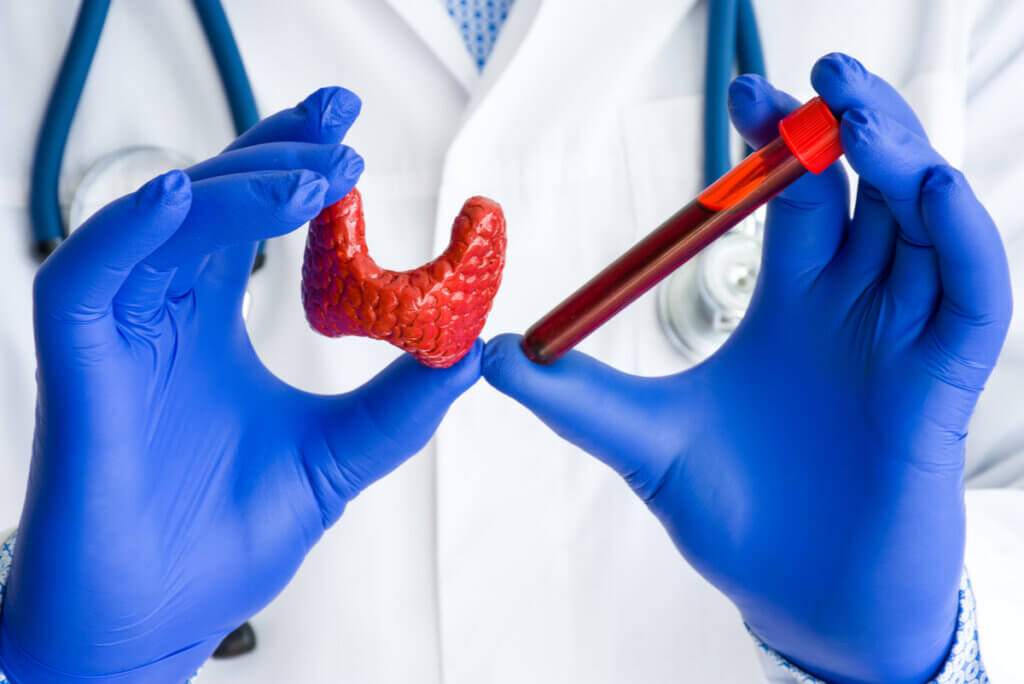Levothyroxine (Eutirox): What Is It and What Is It For?

The thyroid gland is an endocrine organ in charge of synthesizing and secreting hormones that are vital for the body to carry out its functions. When there are problems with the thyroid, you’ll need to use medications to regulate hormone levels; one of them is levothyroxine.
Levothyroxine is the active principle of a drug known commercially as Eutirox ®, which is used to treat diseases related to the thyroid gland. These are synthetic thyroid hormones that simulate the action of the hormones that the body manufactures.
The use of this medication is more frequent than is believed; it’s usually taken orally, but can also be administered intravenously.
What is levothyroxine used for?
This medicine is the therapeutic option par excellence to treat hypothyroidism, a pathology characterized by a deficient production of hormones by the thyroid gland. In this way, levothyroxine is able to raise hormone levels in the blood and reduce symptoms.
Hypothyroidism is one of the most frequent hormonal deficiencies in medical practice. Several pieces of research estimate that 6% of the population suffers from it. So, many people around the world are currently taking this drug.
On the other hand, the compound can also be used to treat some types of thyroid cancer. In this sense, it’s usually combined with surgery, radiotherapy or chemotherapy to stop the growth of the tumor.
Efficacy in the treatment of goiter, or the pathological enlargement of the thyroid gland, was also demonstrated. A reduction in size was seen in 25% of the cases. Finally, levothyroxine is also used in congenital hypothyroidism and after thyroid surgery.

How does this medication work?
The drug is made up of synthetic hormones that seek to perfectly imitate the effect that natural hormones (triiodothyronine and thyroxine) create in the body. By taking it, they’ll be able to increase their levels in the blood and counteract the effects of the deficit.
The synthetic compound is able to bind to the same receptor as thyroid hormones, generating similar responses. In this way, among the effects that levothyroxine causes in the body, the following stand out:
- Increases the metabolism of proteins and carbohydrates
- Accelerates basal metabolism
- Increases cardiac output
- Increases lipolysis or degradation of fatty tissue
- It enhances the development of the brain and various tissues
Thyroid hormones are related to the growth and development of muscle and bone tissue, so low blood levels are often associated with poor growth. In addition, symptoms such as depression, lack of energy, dry skin, and hair loss may also occur.
How to take levothyroxine?
The dose and route of the administration of the drug will depend on the pathology being treated. In general terms, a single dose is taken every day and the dosage is usually increased gradually, based on individual requirements.
Levothyroxine should be taken in the morning on an empty stomach to maximize its absorption. This compound has a very efficient intestinal absorption, which means your body takes advantage of between 60% and 80% of the drug.
There’s a large number of pills available on the market, ranging from 0.025 milligrams of active ingredient to 0.2 milligrams. It’s very important to start the intake as long as you have a medical prescription, as it will be the only way to take the exact amount.
Under no circumstances should levothyroxine or Eutirox® be used as a weight loss mechanism, as this can have serious health consequences.
In the specific case of children, experts recommend basing the dosage according to the needs specified in laboratory tests. However, it should be started with lower doses than those recommended to avoid states of hyperactivity.
Precautions
As with any medication, certain precautions should be taken before taking levothyroxine. You need to remember that thyroid hormones have a direct effect on the heart, increasing the rate and cardiac output.
In this sense, it’s imperative for those with heart diseases to be careful with this medication. The doctor must be informed of their existence. Other situations that warrant caution before the administration of the drug are the following:
- Allergies to some of the components
- Interactions with other drugs
- Breastfeeding
- Use in older adults
- Insufficiency of the adrenal gland
Levothyroxine side effects
On the other hand, levothyroxine can also cause some other side effects. These don’t occur in all patients and, when they do, they’re usually mild. Among the symptoms that may appear as part of the adverse effects, the following stand out:
- Diarrhea, nausea, and vomiting
- Rapid weight loss
- Fever and chills with tremors
- Irregular heartbeat
These symptoms don’t usually last long or prevent you from performing daily activities. However, if they become prolonged, intense, and frequent, you should notify the doctor. You may be taking a higher dose than recommended and an adjustment will be necessary.

An effective and safe medicine
Levothyroxine is a drug that gives clear improvements after just a few months of treatment. It’s used to treat thyroid hormone deficits, which can reach normal values shortly, thus eliminating symptoms.
It’s a very safe medication with few adverse symptoms, however, as we mentioned above, extreme care should be taken with heart disease. In addition, the interaction with other compounds must be taken into account, and so the specialist should be informed if you’re taking other medication.
Finally, complying with the treatment is of the utmost importance in order to obtain the best results. It has been shown that around 22% of patients don’t comply with the prescription as they should.
The thyroid gland is an endocrine organ in charge of synthesizing and secreting hormones that are vital for the body to carry out its functions. When there are problems with the thyroid, you’ll need to use medications to regulate hormone levels; one of them is levothyroxine.
Levothyroxine is the active principle of a drug known commercially as Eutirox ®, which is used to treat diseases related to the thyroid gland. These are synthetic thyroid hormones that simulate the action of the hormones that the body manufactures.
The use of this medication is more frequent than is believed; it’s usually taken orally, but can also be administered intravenously.
What is levothyroxine used for?
This medicine is the therapeutic option par excellence to treat hypothyroidism, a pathology characterized by a deficient production of hormones by the thyroid gland. In this way, levothyroxine is able to raise hormone levels in the blood and reduce symptoms.
Hypothyroidism is one of the most frequent hormonal deficiencies in medical practice. Several pieces of research estimate that 6% of the population suffers from it. So, many people around the world are currently taking this drug.
On the other hand, the compound can also be used to treat some types of thyroid cancer. In this sense, it’s usually combined with surgery, radiotherapy or chemotherapy to stop the growth of the tumor.
Efficacy in the treatment of goiter, or the pathological enlargement of the thyroid gland, was also demonstrated. A reduction in size was seen in 25% of the cases. Finally, levothyroxine is also used in congenital hypothyroidism and after thyroid surgery.

How does this medication work?
The drug is made up of synthetic hormones that seek to perfectly imitate the effect that natural hormones (triiodothyronine and thyroxine) create in the body. By taking it, they’ll be able to increase their levels in the blood and counteract the effects of the deficit.
The synthetic compound is able to bind to the same receptor as thyroid hormones, generating similar responses. In this way, among the effects that levothyroxine causes in the body, the following stand out:
- Increases the metabolism of proteins and carbohydrates
- Accelerates basal metabolism
- Increases cardiac output
- Increases lipolysis or degradation of fatty tissue
- It enhances the development of the brain and various tissues
Thyroid hormones are related to the growth and development of muscle and bone tissue, so low blood levels are often associated with poor growth. In addition, symptoms such as depression, lack of energy, dry skin, and hair loss may also occur.
How to take levothyroxine?
The dose and route of the administration of the drug will depend on the pathology being treated. In general terms, a single dose is taken every day and the dosage is usually increased gradually, based on individual requirements.
Levothyroxine should be taken in the morning on an empty stomach to maximize its absorption. This compound has a very efficient intestinal absorption, which means your body takes advantage of between 60% and 80% of the drug.
There’s a large number of pills available on the market, ranging from 0.025 milligrams of active ingredient to 0.2 milligrams. It’s very important to start the intake as long as you have a medical prescription, as it will be the only way to take the exact amount.
Under no circumstances should levothyroxine or Eutirox® be used as a weight loss mechanism, as this can have serious health consequences.
In the specific case of children, experts recommend basing the dosage according to the needs specified in laboratory tests. However, it should be started with lower doses than those recommended to avoid states of hyperactivity.
Precautions
As with any medication, certain precautions should be taken before taking levothyroxine. You need to remember that thyroid hormones have a direct effect on the heart, increasing the rate and cardiac output.
In this sense, it’s imperative for those with heart diseases to be careful with this medication. The doctor must be informed of their existence. Other situations that warrant caution before the administration of the drug are the following:
- Allergies to some of the components
- Interactions with other drugs
- Breastfeeding
- Use in older adults
- Insufficiency of the adrenal gland
Levothyroxine side effects
On the other hand, levothyroxine can also cause some other side effects. These don’t occur in all patients and, when they do, they’re usually mild. Among the symptoms that may appear as part of the adverse effects, the following stand out:
- Diarrhea, nausea, and vomiting
- Rapid weight loss
- Fever and chills with tremors
- Irregular heartbeat
These symptoms don’t usually last long or prevent you from performing daily activities. However, if they become prolonged, intense, and frequent, you should notify the doctor. You may be taking a higher dose than recommended and an adjustment will be necessary.

An effective and safe medicine
Levothyroxine is a drug that gives clear improvements after just a few months of treatment. It’s used to treat thyroid hormone deficits, which can reach normal values shortly, thus eliminating symptoms.
It’s a very safe medication with few adverse symptoms, however, as we mentioned above, extreme care should be taken with heart disease. In addition, the interaction with other compounds must be taken into account, and so the specialist should be informed if you’re taking other medication.
Finally, complying with the treatment is of the utmost importance in order to obtain the best results. It has been shown that around 22% of patients don’t comply with the prescription as they should.
- Arroyo Bros J, Gil Lluís P, Llauradó Cabot G, Caixàs Pedragós A. Hipotiroidismo primario: consideraciones para una buena utilización del tratamiento con levotiroxina. Medicina Clínica. 2011;136(5):207-214.
- Ortiz-de Zárate, María Elena Medrano, et al. “Guía de práctica clínica. Diagnóstico y tratamiento del hipotiroidismo primario en adultos.” Revista Médica del Instituto Mexicano del Seguro Social 50.1 (2012): 71-80.
- López-Torres Hidalgo R, Carbajal de Lara J. Cumplimiento terapéutico en tratamientos con levotiroxina. ¿Qué podemos hacer para mejorarlo?. Atención Primaria. 2012;44(7):438-439.
- De Diego García P, Trincado Aznar P, Playán Usón J, Albero Gamboa R. Tratamiento con levotiroxina e imatinib. Endocrinología y Nutrición. 2008;55(7):304-307.
- Builes Barrera C, Palacos Bayona K, Jaimes Barragán F. Dosis de levotiroxina varía según la etiología del hipotiroidismo y el peso corporal. Revista Colombiana de Endocrinología, Diabetes & Metabolismo. 2017; 1(1):27-32.
- Levotiroxina Sódica [Internet]. Asociación Española de Pediatría. 2016. Available from: https://www.aeped.es/comite-medicamentos/pediamecum/levotiroxina-sodica.
- Levotiroxina: MedlinePlus medicinas [Internet]. Medlineplus.gov. 2019. Available from: https://medlineplus.gov/spanish/druginfo/meds/a682461-es.html.
- González Fernández, Ramón, Ahmed Llapur Gónzalez, and Domingo Pérez González. “Cirugía conservadora y tiroidectomía total en el cáncer tiroideo bien diferenciado.” Revista Cubana de Cirugía 56.4 (2017): 0-0.
Este texto se ofrece únicamente con propósitos informativos y no reemplaza la consulta con un profesional. Ante dudas, consulta a tu especialista.







